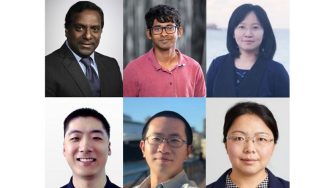CSE researchers receive over 1.4 million for ARC Discovery Projects
UNSW CSE academics have received funding for three projects in the latest Discovery Project round from the Australian Research Council (ARC).
UNSW CSE academics have received funding for three projects in the latest Discovery Project round from the Australian Research Council (ARC).

In total, the three CSE projects have received $1.42 million in funding. The grants will support research into wider deployment of modern DNA technologies, processing big temporal graphs, and generalisable and unbiased dynamic recommender systems.
Discovery Projects is the largest scheme under the ARC National Competitive Grants Program. It provides funding of between $30,000 and $500,000 each year for up to five consecutive years.
The Projects are undertaken to expand the knowledge base and research capacity in Australia. The goal is to benefit Australia economically, commercially, environmentally, socially and/or culturally. Among other things, funding may be used for research associates or assistants and technicians, access to research and infrastructure facilities, equipment and consumables, and essential field research.
Professor Aaron Quigley, Head of School at Computer Science and Engineering, congratulated the grant recipients.
"The School of Computer Science and Engineering is delighted to see these examples of world leading, world beating, and world building research being funded here in our School,” Professor Quigley said.
“These grants are supporting academics who define the cutting edge of research internationally. Their existing work has already had significant impact on making the world better.”
“We look forward to seeing the outcomes of these projects as they move from state-of-the-art research through development, deployment, and impact. From fundamental research in computer science, to inspiring others and impacting the lives of billions of people, the work in CSE leads computer science in Australia.”
Among the successful recipients from CSE are Professor Sridevan Parameswaran and Dr Hasindu Gamaarachchi, who were awarded $439,110. Their project aims to create a Domain Specific Computing System to analyse data from third-generation DNA sequencers.
The expected outcome is a portable, low-power computing system, enabling in-situ analysis, and facilitating far wider deployment of modern DNA technologies. For example, it will allow DNA analysis techniques to be deployed in remote areas and in places without large servers or access to high-speed networks, as well as enable quicker analysis and rapid response. The system will also be used to train a cohort of research and honours students.
Professor Wenjie Zhang, Professor Dong Wen and Professor Xiaoyang Wang from UNSW CSE and Professor Ying Zhang from the University of Sydney have secured funding of $530,953. Their project aims to develop efficient and scalable algorithms to process big temporal graphs in the Cloud.
The expected outcome includes theoretical foundations and scalable algorithms to process big temporal graphs, as well as a system prototype for evaluation and demonstrating practical value. Success in this project should see significant benefits for many important applications such as cybersecurity, e-commerce, health and road networks.
Associate Professor Lina Yao from UNSW CSE and Professor Michael Sheng from Macquarie University were granted funding of $450,000. Their project aims to develop the foundations for building generalisable and unbiased dynamic recommender systems. These systems will facilitate intelligent decision-making, prompt contextualised and personalised strategic plans, and support context-aware action recourse.
The result of this project will not only maintain Australia's leadership in this frontier research area, but also serve as an excellent vehicle for the education and training of our generation of scholars and engineers.